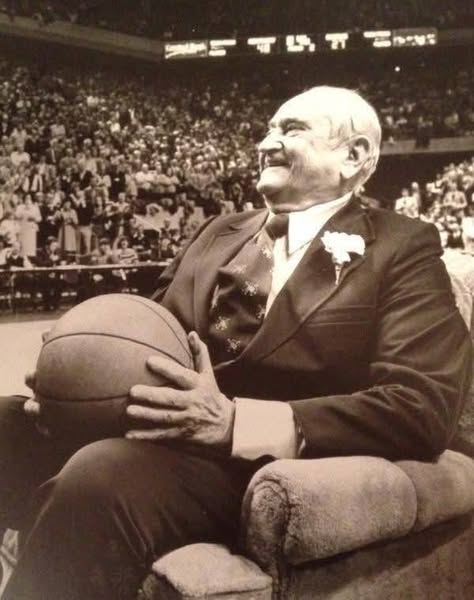On March 18, 1972, a towering chapter in college basketball history came to an end as Adolph Rupp coached his final game for the University of Kentucky Wildcats. After 41 seasons on the sideline, “The Baron of the Bluegrass” walked off the court for the last time, his legendary tenure concluding with a 73-54 loss to Florida State in the NCAA tournament. Though the game marked a quiet end to a thunderous career, the magnitude of Rupp’s legacy is anything but quiet.
Adolph Rupp’s journey with the Wildcats began on December 18, 1930, in a game against Georgetown College. From the outset, Rupp set the tone for what would become a dynasty. In his debut, he unleashed all 17 of his players en route to a 67-19 victory, showcasing a command of the game and a commitment to team depth and discipline that would define his career. Over the next four decades, Rupp’s name would become synonymous with college basketball greatness, his teams dominating the Southeastern Conference and leaving an indelible mark on the national stage.
Rupp’s Wildcats captured four NCAA championships under his leadership, winning titles in 1948, 1949, 1951, and 1958. The 1948 and 1949 squads, in particular, helped elevate Kentucky into the national spotlight, and the back-to-back titles solidified Rupp’s place among the sport’s coaching elite. His teams would go on to make 20 NCAA tournament appearances, reach the Final Four six times, and win 27 SEC regular season titles, a record of consistent excellence that made Lexington the epicenter of college hoops.
More than the wins and the trophies, however, it was Rupp’s approach to the game that set him apart. A tactician known for his exacting standards and relentless pursuit of perfection, Rupp was as much a teacher as a coach. Practices were often grueling, the attention to detail obsessive, but the results spoke volumes. Under his watch, the Wildcats won 876 games, a staggering total that placed him atop the NCAA’s all-time coaching wins list upon his retirement. The standard he set became the benchmark for generations of coaches to follow.
Rupp’s influence extended beyond wins and banners. Over the course of his career, he coached 32 All-Americans who received the honor 50 times, 52 All-SEC players (91 selections), and 44 NBA Draft picks. His players included two National Players of the Year and four future Naismith Memorial Basketball Hall of Fame inductees. His fingerprints are etched into the fabric of basketball history, not just in Kentucky but throughout the sport. Rupp also guided seven Olympic gold medalists and built a program that others aspired to replicate.
A five-time National Coach of the Year and seven-time Conference Coach of the Year, Rupp’s resume reads like a roll call of coaching milestones. But perhaps one of the most enduring aspects of his legacy is the culture he created. Rupp’s teams weren’t just built to win—they were built to dominate, to out-think, out-hustle, and outlast the opposition. His emphasis on fundamentals, defensive intensity, and strategic preparation became trademarks of the Kentucky brand.
Even in years when championships eluded the Wildcats, Rupp’s squads remained competitive and compelling. The 1966 team, famously known as “Rupp’s Runts,” embodied that spirit. Lacking size but overflowing with talent and tenacity, the team defied expectations and reached the national championship game, falling to Texas Western in a historic matchup that transcended sports. Though that loss would be remembered for its broader cultural implications, Rupp’s ability to extract greatness from an undersized lineup stood as a testament to his coaching prowess.
Beyond his more well-known accomplishments, Rupp’s teams also claimed retroactive national championships as determined by independent organizations. The Helms Athletic Foundation named Kentucky the national champion in 1933 and 1954, while the Premo-Porretta Power Poll awarded titles to his 1934, 1947, and 1948 teams. These honors, though not officially recognized by the NCAA, speak to the sustained dominance Rupp maintained throughout different eras of college basketball.
Rupp’s reach extended to the polls as well. His Kentucky teams finished ranked No. 1 in the final Associated Press college basketball poll six times and topped the United Press International (Coaches) poll on four occasions. His dominance was not confined to a single golden era—it stretched across decades, surviving wartime interruptions, rule changes, and generational shifts in how the game was played.
Despite all his accomplishments, Rupp’s coaching career did not end on his own terms. The University of Kentucky’s mandatory retirement policy, which required employees to step down at age 70, forced Rupp into retirement following the 1971–72 season. The policy, which made no exceptions even for legends, meant that Rupp had to say goodbye to the sidelines not because he wanted to, but because policy demanded it. Even in his final year, Rupp remained as competitive as ever, guiding the Wildcats to another NCAA tournament berth, a testament to his enduring brilliance and refusal to fade quietly.
His final game, played against Florida State, may not have ended in celebration, but it was nonetheless historic. As the final buzzer sounded in the 73-54 defeat, it marked the close of a career that spanned four decades and helped define the sport. There were no fireworks, no farewell tour, no victory lap—but Rupp’s impact was already etched into the annals of college basketball.
Known for his commanding presence, white hair, and ever-present glare from the sidelines, Rupp became a larger-than-life figure. He was a disciplinarian, a motivator, and a perfectionist. Critics often labeled him gruff or difficult, but those close to the program knew he demanded greatness because he believed in the greatness of his players and his university. He wasn’t just coaching basketball—he was building a legacy.
That legacy extended beyond Lexington. Rupp was born in Halstead, Kansas, and played under the legendary Phog Allen at the University of Kansas, making his own mark as a player before embarking on a coaching career that would eclipse nearly all others. In many ways, Rupp represented a bridge between the game’s early days and its modern incarnation. His name became synonymous with winning, and his influence reached from high school gyms to the Olympic hardwood.
Fittingly, Rupp’s contributions did not go unrecognized. He was inducted into multiple halls of fame, including the Naismith Memorial Basketball Hall of Fame, the College Basketball Hall of Fame, the Kentucky Athletic Hall of Fame, and the Kansas Athletic Hall of Fame. His name adorns the home of Kentucky basketball—Rupp Arena—a venue as iconic as the man himself, where banners hang and history lives.
Though his coaching career ended with the institution’s retirement mandate, Rupp’s impact continues to echo across generations. Every time Kentucky takes the court, every time a coach references the blueprint for success, every time a championship banner is raised in the Bluegrass State, Adolph Rupp’s shadow looms large. His dedication to the game, to excellence, and to the pursuit of victory shaped one of the most storied programs in college sports.
In the years that followed his retirement, Rupp remained a towering figure in the sport, even as the game evolved. The coaching tree he helped grow, the players he mentored, and the tradition he established all continue to flourish. As college basketball changes with the times—ushering in new eras, rules, and styles—Rupp’s foundational role remains untouchable.
The game on March 18, 1972, may have been a loss on the scoreboard, but it marked a monumental victory for legacy, endurance, and a love of basketball that transcended numbers. For 41 seasons, Adolph Rupp gave everything he had to the University of Kentucky. He built a program, raised a standard, and created a legend that will live as long as basketball is played.
His career was not without controversy or criticism, but few would argue his place in the pantheon of the sport’s greats. He coached not just to win, but to inspire. To elevate. To shape young men into champions, and a program into an institution. That is the legacy of Adolph Rupp.
As the final horn sounded on that March night in 1972, a coaching giant took his final step off the court, not with a flourish, but with the quiet dignity of a man who had given everything to the game. The Baron of the Bluegrass may have coached his last game, but his influence endures—in the rafters, in the record books, and in the hearts of all who understand what it means to wear Kentucky blue.



